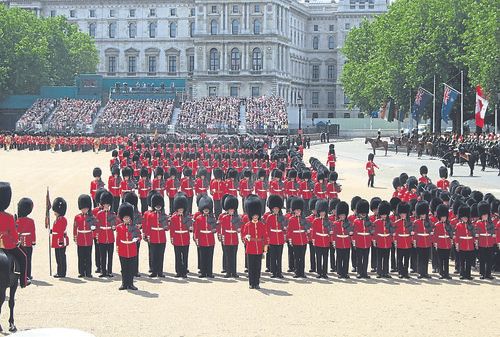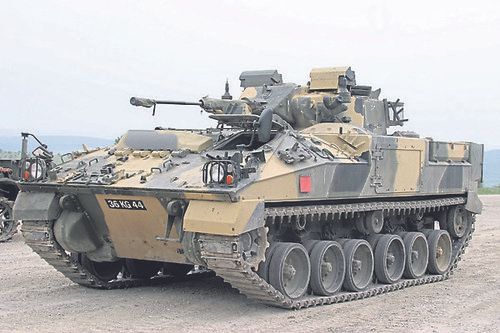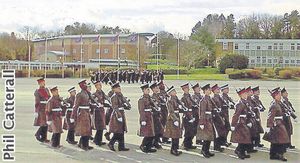At the age of 16 I probably could have joined any regiment, but I chose the Scots Guards, which is an infantry unit. However, I was very small for my age and had been bullied for it at school. I was only eight stone with a small frame. When I had my army daysack on my back, the straps would fall off because my shoulders were so slight!
I would say that when I enlisted I was smart but didn’t have much common sense. It took me a long time to gain some traction in the military. The early days of my military career could be described as my not really knowing much nor grasping what I was supposed to be doing. Most of my peers who joined at the same time were in the same boat as me.
Being young, the majority of us didn’t progress up the ranks into leadership roles as much as we should have. My training commenced at Glencorse in Penicuik, Scotland on the junior leadership programme, which lasted six months. After that I was posted to Catterick, North Yorkshire, for Phase 2 at the Infantry Training Centre.
Then I headed down south to London, where I was to experience my first taste of the ‘real’ army as a Queen’s Guardsman, with F Company in the First Battalion Scots Guards.
As this is the ceremonial company, it involved donning their bright red uniform and wearing their furry hat! I was in London for about three years. At first this was with F Company in Chelsea Barracks, which was demolished on 26 September 2008 after the site was sold for a housing development.

Trooping the Colour
I then moved to C Company as a rifleman. We were based at Wellington Barracks in Birdcage Walk, which is right beside Buckingham Palace, and the battalion took its turn guarding the palace.
We also took part in leading the Queen’s birthday parade: Trooping the Colour. When we were not guarding the Queen, we did a lot of military exercises, training to be ready for war or any other event that needed military intervention.
One such intervention came during the Fire Brigade strikes in 2002 and 2003; we became temporary firefighters. It was an interesting time, to say the least! Once my friend Kenny and I were getting a hose out. I would usually be the standpipe man responsible for turning the water on and then I would join the others extending the rest of the hose.
That day Kenny and I were putting on the very thin nozzle together. But with both of us being slightly built, and the water pressure being so great, we were blown back into a greenhouse, smashing all the glass, which then fell on top of us!
We did a lot of good in this temporary role and we travelled all around London as well. However, the Fire Brigade strikes stopped my regiment going on an important training exercise in Kenya. This in turn stopped my regiment from being available for the Iraq invasion. Having said that, I would have two operational tours of Iraq: Telic 5 in 2005 and Telic 7 in 2007.
Salisbury Plain was one of the places where we did lots of exercises and military manoeuvres. During my first military exercise with F Company, I very quickly found myself involved with signals, using and carrying radio equipment. I also did a similar role in Sennybridge (the third largest military training area in the UK, which lies to the north of the Brecon Beacons National Park in Wales).

I had quite an affinity with radio communications, which I maintained all through my army career, whether in a fighting platoon, in the Signals, or in the Operations Room in Battalion Headquarters.
Having been based in London, we were then moved to Europe, where we spent six years in Munster, Germany. During that time, we left the role of light infantry and went into armoured infantry, in particular using Warrior vehicles…
Personal battles
Regretfully, I was never the most moral of people. When I got to Germany, I would visit what Germans called ‘nightclubs’, but what we might recognise as whorehouses, to use prostitutes.
I was also known as the man to go and see if you wanted pornography. I had quite a lot of it — a cupboard full of the stuff. This was a good number of years ago, so there wasn’t so much of the easy access that the internet provides today. Men would come to me to borrow the literature I had stashed away.
Men and alcohol are also never far away from each other. Looking back, I would describe myself as ‘alcohol dependent’. It was not unusual for me to be found in the gutter, totally inebriated. One time, after a very heavy night of drinking, I got into a taxi and was delivered to the wrong camp in Germany!
Instead of trying to find my way around, I just slept on the pavement. The next morning was very ‘interesting’ as, having been delivered back to my camp, I then had to face the Regimental Sergeant Major. I had been lifted from my bed and put into, or rather poured into, my uniform, shaved and then posted at his door, where he tore me apart by shouting very loudly at me for several minutes.
It was very uncomfortable, but totally deserved. I was not the worst kind of guy in the world; I was not the best sort of person either. While not religious, I thought of myself as ‘good’ and did not really see myself as a ‘sinner’. Like many of the young soldiers who join the army, my home life was not straightforward: I can’t say that I was raised in a very happy home.
Home life
When I was a small child, my dad was violent towards my mother, which I witnessed several times. My mum and dad divorced when I was aged about eight. After that, most contact with my father was severed until my late teens when I resumed contact with him…
When I was 12, my mother met and married my stepdad. With her I grew up in a non-religious home, but my mother was very superstitious. She would visit gypsy tents and take part in tarot card readings. Later on in life she loved to watch programmes such as My Big Fat Gypsy Wedding. She would want to emulate what she saw, even though this travellers’ way of life is not in our DNA. It seemed she was drawn to that culture, with its big dresses and superstition, as well as being attracted to occult practices, such as psychics, Ouija boards and the like.
My mother tried very hard to give us a ‘good life’ as she saw it, and even more so during those years as a single mother. She would work all the hours she could to provide me and my sister with lots of stuff. However, with my mother working so hard, my sister and I were often left to ourselves…
Iraq
My company continued in Germany for six years, doing the kind of roles that required armoured infantry work, including two tours of Iraq. My first tour was interesting — a few rockets were fired at us and there was one notable small-arms contact — but generally it was quiet.
This was in 2005, during Operation Telic 5, when the warfare had ended and everything seemed to be going quite well. The university was open and by then boys and girls were going back to school. There is a picture of me in the Scots Guards Magazine playing football with a lot of young Iraqi boys. I have my body armour on but am wearing my beret, my soft hat.
However, when we returned in 2007 for Telic 7, everything had changed. The university was still open but the schools had closed. The mullahs and religious factions had come back into power and back into the political arena. An insurgency had also been raging throughout the country. So we had to exchange our berets for helmets and full body armour.
Gavin Dickson
This extract is taken — by kind permission —from the booklet, We will remember them, Gavin Dickson and D. J. Carswell (2018). ASR Gavin Dickson serves with SASRA (The Soldiers’ & Airmen’s Scripture Readers Association). Copies of the booklet, including bulk copies for evangelistic use, can be ordered from 10 of Those (0330 2233423). December’s Evangelical Times will continue this true story, describing how Gavin found salvation through personal faith in Jesus Christ. ©Ten of Those






